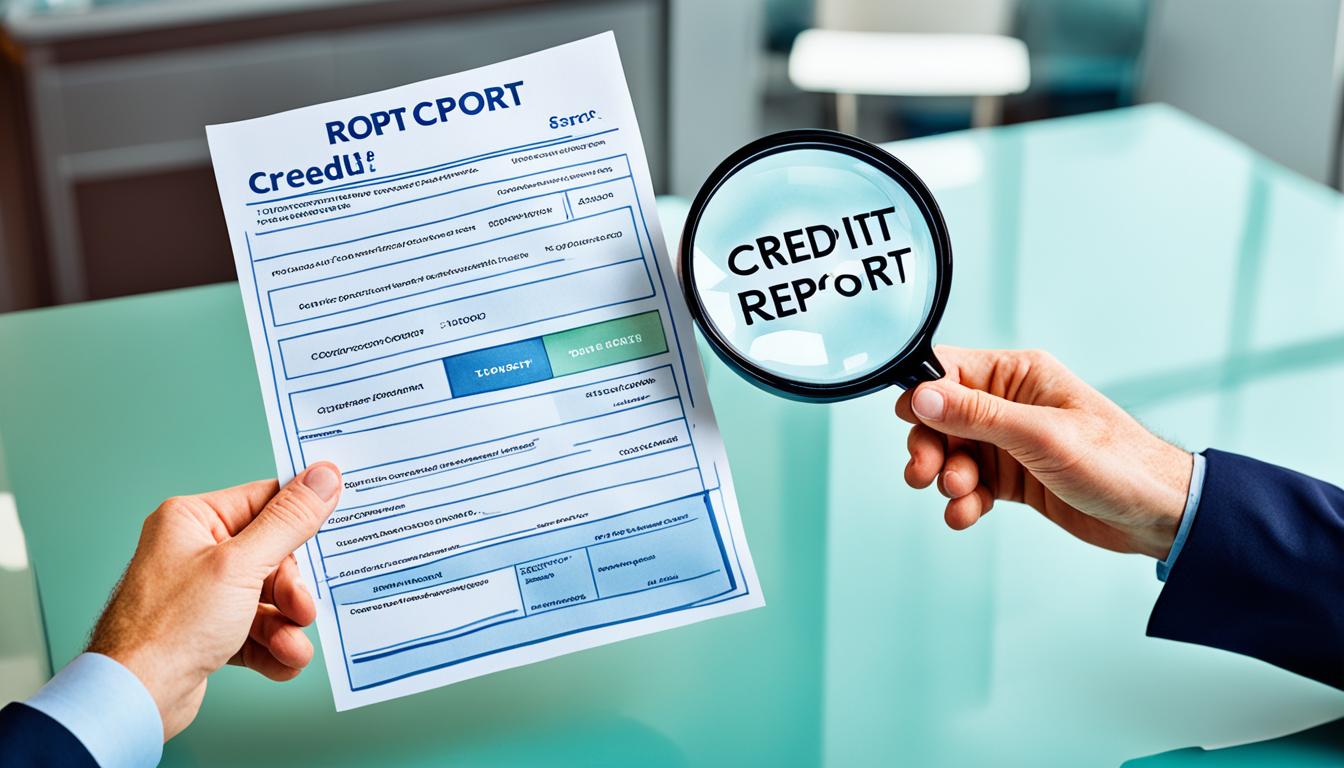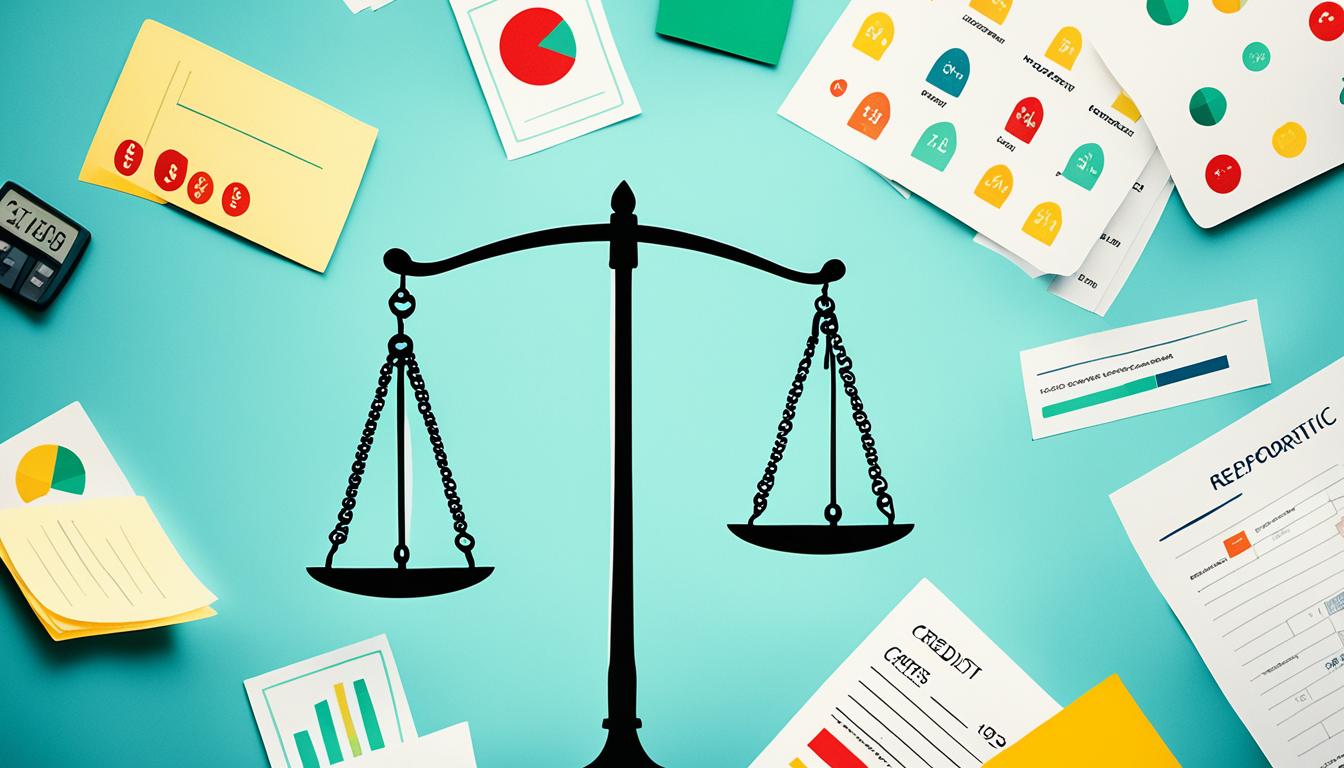Unfair credit reporting can badly hurt your money reputation. You might see mistakes or wrong info in your credit report. It’s key to fight these problems properly. The Fair Credit Reporting Act (FCRA) is there to help. It lets you challenge things that are not right. Knowing your rights helps you fix your financial name.
Inaccurate or false items in your credit report is what we mean by unfair credit reporting. This could be wrong personal info, reported late payments that didn’t happen, or accounts you didn’t know about. These can stop you from getting loans or make you pay more interest. Fixing these issues is a must to protect your money status.
The FCRA is a big rule that controls how credit reporting companies work. It gives people the power to fight wrong or old info on their reports. These companies must check into your complaints and fix what’s wrong fast. Knowing and using your rights is your best bet against bad credit info.
If you spot errors in your credit report, act quickly. Get copies of your report from the main reporting companies. Check it all carefully for mistakes. If you find any, tell the company with proof. They must look into it within a month and fix any wrong details. If they don’t, you can complain to the right government group or get a lawyer to help.
For tricky cases, or when credit companies won’t fix mistakes, a lawyer may help a lot. They know the FCRA really well and can walk you through the fight. They are good at writing letters to fight the errors, pushing for investigations, and going to court if needed. With a good lawyer, you stand a better chance of setting things right.
Key Takeaways:
- Unfair credit reporting can negatively impact your financial reputation.
- The Fair Credit Reporting Act provides rights and protections for consumers.
- Identifying and addressing inaccuracies in your credit report is crucial.
- Disputing errors with credit reporting agencies is a necessary step.
- Legal assistance from a credit report lawyer can be beneficial in complex cases.
Understanding Unfair Credit Reporting and its Consequences
Unfair credit reporting can really hurt your finances. It happens when your credit report has false information. This could be wrong personal details, debts you didn’t owe, or accounts you didn’t open. These wrong entries might lead to you not getting loans or paying more in interest.
When you apply for a loan, banks and lenders check your credit report. They decide how trustworthy you are. If they see wrong things, they might offer you worse deals. This makes managing money harder.
Say your report says you missed payments when you didn’t. Lenders could think you’re risky and refuse to lend you money. If you do get a loan, you might pay more in interest. This adds to your debt stress.
It’s important to fix these problems fast to protect your financial score. Check your credit reports often for mistakes. You can dispute any wrong info thanks to the Fair Credit Reporting Act. This right is there to help you.
Consequences of Unfair Credit Reporting
Unfair credit reports can deeply affect your money matters. It could mean:
- Loan Denials: Mistakes in your report can lead to loan rejections. Lenders use reports to judge you, and errors hurt your chances.
- Higher Interest Rates: If lenders see you as risky due to mistakes, you might get loans at higher rates. This means you pay more.
- Missed Financial Opportunities: Wrong info can stop you from getting good chances, like a mortgage or a job that needs a credit check.
- Difficulty Obtaining Credit: Errors can make it hard to get credit. This includes credit cards or other financial help, making it tough to build credit.
Fixing errors in your credit report is key. Knowing your rights and the dispute process helps. This way, you can keep fair chances in getting loans or credit.

The Importance of the Fair Credit Reporting Act
The Fair Credit Reporting Act (FCRA) is a key law that protects people from wrong credit info. It oversees how credit agencies use and report on your credit. This helps make sure your credit reports are fair and accurate.
The FCRA gives you a lot of power over your credit info. You can challenge any wrong details in your credit report. So, if you see anything that’s not right, you can ask to fix it.
If you complain, the credit agencies must check and fix the errors. This is very important because wrong credit info can hurt your chances of getting credit, good rates, or a job. Using the FCRA helps you keep your credit record correct.
The Role of Credit Reporting Agencies
Credit reporting agencies track your credit activities. They pull info from banks, lenders, and public records to make your report. This report shows others your credit history and how reliable you are financially.
But, these agencies can make mistakes. They might add info that’s not true, affecting your credit score. That’s why it’s smart to check your reports regularly with Equifax, Experian, and TransUnion.
If you spot mistakes, it’s important to act. Use the FCRA rights to ask for a review and a fix. Being active in keeping your credit info correct helps protect your financial image.
Seeking Damages for Violations
Besides fixing mistakes, the FCRA says you can get money for certain wrongs. If a credit agency messes up your dispute, you might be able to claim damages.
If you think a credit agency has not looked into your dispute well, get a lawyer. They can help you understand if you can get money for the issue. They’ll make sure the law protects your rights.
It’s key to know your FCRA rights to fight for fair credit checking. By checking your reports, disputing errors, and having legal help if needed, you can protect your financial future.

- Regularly review your credit reports from all three major credit bureaus – Equifax, Experian, and TransUnion.
- If you identify any inaccuracies, file a dispute with the credit reporting agency and demand an investigation.
- Be proactive in ensuring the accuracy of your credit reports and protecting your financial reputation.
- Consult with a legal professional if you believe your rights under the FCRA have been violated.
Taking Steps to Challenge Unfair Credit Reporting
If mistakes or wrong info show up in your credit report, acting fast is key. By challenging these errors, you protect your financial name. Below, check out some easy steps to fight back on unfair credit reports:
First off, get a fresh copy of your credit report from all main agencies. This way, you see all your credit history. You can note any wrong info that needs fixing.
Next, look closely at your report for any mistakes. Focus on details like your personal info, debts, and payments. Any slip-ups should be noted.
Then, if you spot errors, let the credit agency know. You have the right under the Fair Credit Reporting Act to fix these errors.
“I found an error on my report, a missed payment I never made. I sent proof that I was up to date, and they fixed it.” – John Smith, a consumer who successfully challenged unfair credit reporting
When you dispute a mistake, add lots of proof to back your claim. This might mean sharing bills or statements. Strong proof helps your case.
- After you complain, the agency has to check within a month. If they find the data you disputed was wrong, they have to fix it.
- If they don’t correct it, or won’t check your claim, tell the Consumer Financial Protection Bureau (CFPB). They’ll look into your case and help out.

Following these steps lets you stand up to unfair credit reporting. Remember, the law is on your side to fight for accurate credit reports. By knowing your rights and doing things right, you can keep your financial standing strong. Here’s to a better financial future for you!
The Power of Legal Assistance in Combatting Unfair Credit Reporting
If you find mistakes on your credit report that credit bureaus won’t fix, a credit report lawyer can help. They know the rules of the Fair Credit Reporting Act well. So, they can advise and assist you in arguing the errors.
The Fair Credit Reporting Act aims to protect your credit rights. But, it can be tough to figure things out on your own. A lawyer skilled in credit reports can be a game-changer. They will help you present a strong case to dispute wrong information.
A credit report lawyer starts by studying your case. They check your report for any FCRA violations. Then, they suggest the right steps to take. This might mean sending dispute letters, collecting proof, or talking to the agencies for you.
“Having a skilled credit report lawyer on your side can improve your chances of fixing unfair reports.”
Lawyers who specialize in credit reports know how to talk to the agencies. They’re familiar with the laws the agencies must follow. Their knowledge can lead to better results for your dispute and to the corrections you need.
Sometimes, agencies don’t change your report, even if they should. In these cases, a lawyer can file formal complaints. They can navigate the legal process to protect your rights. This forces the agencies to follow through.
Obtaining Compensation and Damages
If a lawyer finds that the agency broke the rules on purpose, you might get compensation. This could be money to cover any losses you suffered. Plus, the agency might have to pay extra as a penalty.
Credit report lawyers often take payment only if they win your case. This makes it possible for anyone to get help with credit report issues, regardless of money up front.

Conclusion
Unfair credit reports can hurt your money situation. Mistakes in your report can make you pay more interest. They can also stop you from getting loans. And, they might hurt how others see your finances. But, knowing what the Fair Credit Reporting Act allows and fighting back can help.
You should check your credit report often to spot mistakes early. The Act lets people fix wrong or old information in their reports. So, by using this law, you can make sure your credit details are right.
If fixing your report seems hard, a credit report lawyer can help. They know how to write strong letters to fix errors. They can also start investigations or sue, which might get results.
Don’t put off dealing with bad credit reports. Act now to protect your financial standing. Stay alert, know your rights, and get legal help when you need it. This can lead to a brighter financial future. Fight back against unfair reports to keep your money safe.
FAQ
What is unfair credit reporting?
Unfair credit reporting is when your credit report has wrong information. This can really hurt your finances.
How can unfair credit reporting impact me?
It might make it hard to get loans. Or, you might end up paying a lot more in interest. This can affect how people see your money skills.
What is the Fair Credit Reporting Act (FCRA)?
The FCRA is a law that controls credit reporting. It lets people fight against wrong credit report details.
How can I dispute inaccurate information on my credit report?
First, get a copy of your credit report. Look for mistakes. Then, contact the credit agency with any proof of errors.
They have to check and fix any wrong info.
What can I do if the credit reporting agency refuses to correct the information?
If they won’t fix the info, report it to the Consumer Financial Protection Bureau. You can also get a lawyer to help.
How can a credit report lawyer help me?
A lawyer specializing in credit reports can advise you. They can write strong letters, investigate, and take legal steps. They’ll fight to fix unfair credit reports and improve your financial standing.


